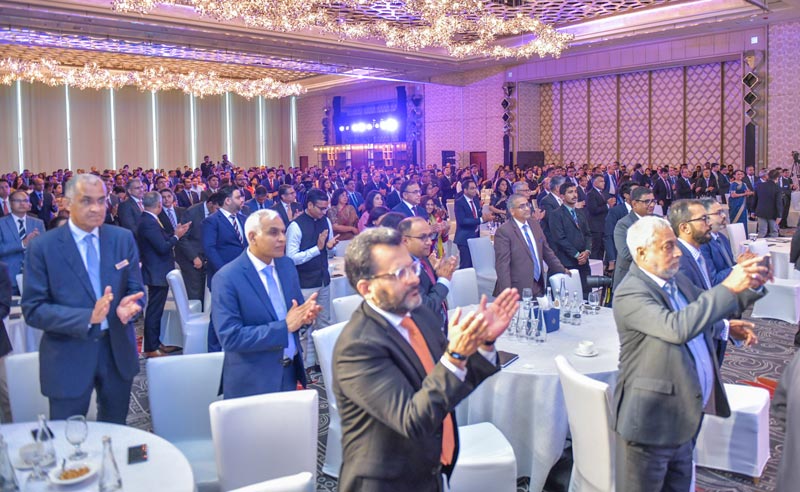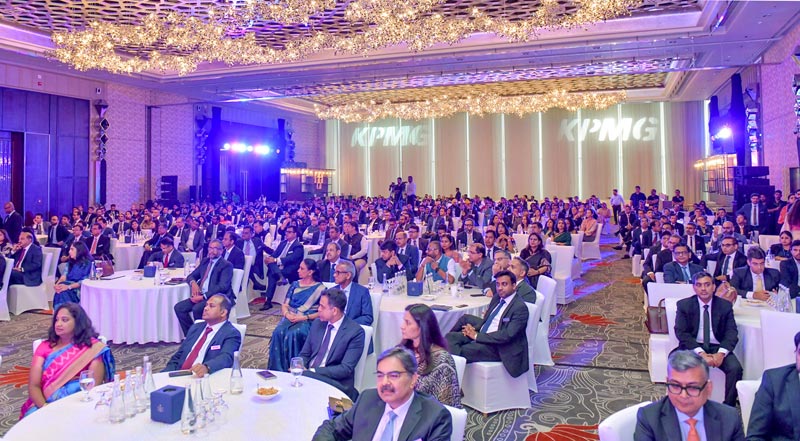Sunday Apr 06, 2025
Sunday Apr 06, 2025
Thursday, 4 July 2024 03:25 - - {{hitsCtrl.values.hits}}
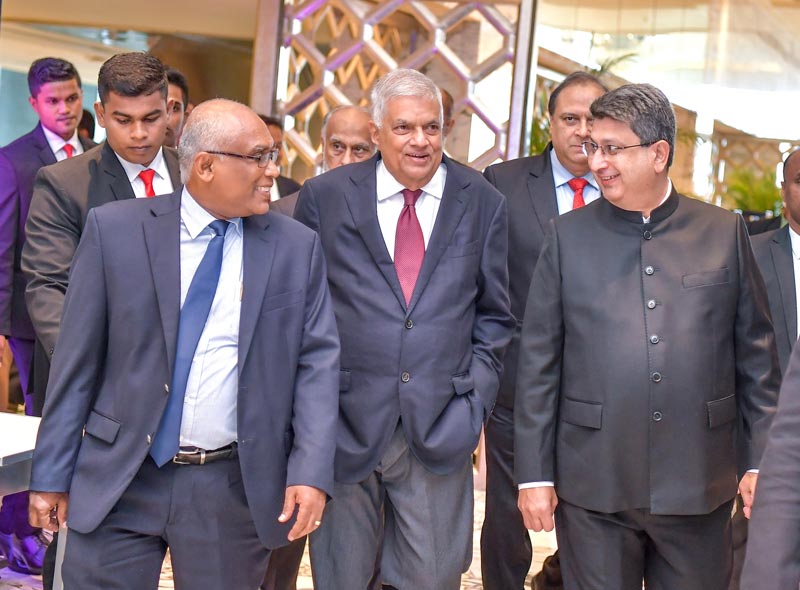
President Ranil Wickremesinghe with a smile in conversation with KPMG India’s CEO Yezdi Nagporewalla (right) and KPMG Sri Lanka Managing Partner Priyanka Jayatilake at the inauguration of KPMG All India Partner’s Meet 2024 in Colombo recently
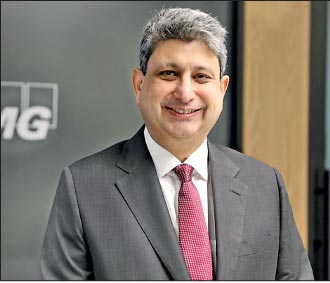 |
| KPMG in India CEO Yezdi Nagporewalla |
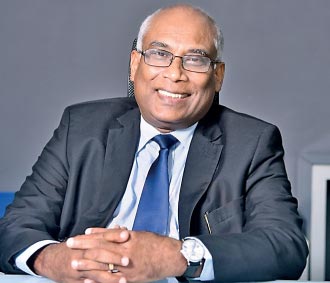 |
| KPMG in Sri Lanka Managing Partner Priyanka Jayatilake
|
By Darshana Abayasingha
KPMG in India hosted its 31st All India Partners Meet (AIPM) 2024 in Colombo recently, as over 600 partners attached to KPMG in India in the subcontinent enjoying scenic Sri Lanka. Addressing the gathering was the President of Sri Lanka Ranil Wickremesinghe, who stressed on the importance of a strong collaboration with India to achieve the country’s development goals as the country is progressing on its recovery journey.
Speaking to the Daily FT, KPMG in India CEO Yezdi Nagporewalla said they chose to host this year’s forum in Sri Lanka as the two countries share tremendous cultural commonalities, which extend to economic and geographic aspects while both the KPMG firms share a very strong relationship built over many years. “We always look for welcoming locations and there’s nothing more vibrant than Colombo at this juncture,” the CEO said.
Touching on the macro aspects of the host nation, Nagporewalla said the Sri Lankan economy has started to grow again following its rough patch, and the Government is doing the right things in terms of directional policies. “You are already seeing it unfolding. The financial indices, inflation and trade balance are showing positive results. From a timing perspective, it’s a good juncture, and things will start improving and growing,” he averred.
The KPMG in Sri Lanka Managing Partner Priyanka Jayatilake said that the journey of recovery has begun, and whilst this may take up to five or more years, this is required and is the right way to go. He noted that several corrective measures and safeguards need to be built in to ensure that there is no repetition of past mistakes and move forward, and the signs are good for development.
However, Jayatilake pointed to the need to grow foreign investments, and to build a conducive infrastructure and environment to enhance ease of doing business, and noted Sri Lanka could draw some lessons from India in this sphere. The Managing Partner of Sri Lanka said, “India has made great strides in terms of streamlining processes, policies, and procedures, despite the size of the market, and considering our cultural and social similarities if something works in India, it is very likely that it will work here as well.”
In terms of aligning efforts with the Government to shape the growth agenda, Nagporewalla said KPMG in India has a proud history of collaborating with the Government to drive the growth agenda and offer opportunities for business to grow. He noted that they could employ this experience and assist with such initiatives here in Sri Lanka as well together with KPMG in Sri Lanka, and pointed to the potential of the Colombo Port City that would serve as a specialised economic zone, attractive for investments.
“I’d like to highlight a few points that KPMG has assisted the Indian Government with. The Ease of Doing Business Index, that’s a critical one again where we worked with the Government of India. We got good results in the end, and we improved over 67 points in the World Bank index, which was very special. Now we are graduating to Cost of Doing Business. We are looking at whilst it’s easy to do business, how costly is it? and where can we improve?”
“Also, if you go back to 2016, we had over 300 startups. Currently, we have more than 130,000 registered startups. KPMG in India is among the firms which were instrumental in the entire initiative across stakeholders in India. That’s something that we are very proud of in terms of creating the framework for incubation, growth and even the awards. That has been a successful initiative where we worked with the Government of India. A third sector that I would like to highlight is the textile sector. Again, across diverse stakeholders covering the whole value chain, we have been able to transform how they work. So, these are some of the initiatives where we have jointly worked with the Government and developed significant transformation, and that can be replicated in Sri Lanka,” Nagporewalla said.
The two heads also explained how the two offices collaborate and share ideas, and this process becomes easier due to the time-tested regional commonalities and friendship both the countries and the firms share. Jayatilake said there is a considerable share of business and interest that comes into Sri Lanka via their Indian counterparts, and there is renewed interest to attract more investments into Sri Lanka from the subcontinent. He pointed out that several Indian companies, including Adani, has invested in Sri Lanka despite the economic crisis, and this serves as a signal to others on the capacity and confidence to do business in Sri Lanka.
With respect to improving governance through collaboration, Nagporewalla explained that in India, there is now a very strong regulatory and risk practice with technology as the underlying theme. “So, not only will you have practices which are more defensive, if you like, but the elements of technology automatically reduce human intervention. That automatically reduces all exposure to risks that you may have.”
Jayatilake also added that without adequate governance practice it becomes difficult and sometimes impossible to do business. Regulators should understand that position and take necessary corrective measures. The right processes must be supported with the right policy and transparency. Jayatilake said there are many models where Sri Lanka could draw from India to enhance their governance.
“Similar to what India is driving now, along with governance and ease of doing business, the cost of doing business and a transaction also must be low. So, as the Secretary to the Treasury said, a general transformation is required. That’s where in Sri Lanka most Government entities can be digitalised. And it’s not just digitalisation but it should be a digital transformation. So, we will look to work together with agencies to bring in the process optimisation, minimise duplication and come down to a single window for transactions,” Jayatilake averred.
Commenting on India’s growth trajectory, Nagporewalla said as the economy expands, the small and medium sector will grow exponentially. He noted the Indian Government is committed to developing necessary infrastructure, and this is drawing significant interest and investment alongside digitisation.
“Next is the Make in India piece, which is where the entire manufacturing and industrial aspects come in. So, where it’s product-linked incentives which impact manufacturing, we are looking at that aspect closely to reduce dependence on other aspects. So, these are the initiatives which are driving the growth of the Indian economy. There is tremendous opportunity, and a once in a lifetime chance for us in terms of timing. It’s already showing the right signs. If you see the confidence of the business today, it’s far deeper than what it was in any earlier era. How do we capitalise from this?”
Here in Sri Lanka, Jayatilake spoke of the need to adopt long-term policies to boost investor confidence, “so there are reasonable wins for all parties.” Attracting investment is akin to a competition and Sri Lanka must see what it must do to get ahead of others. He pointed to the Port City as an opportunity, adding that its proximity to India could provide adequate incentive. “People could work there, or just fly in for the weekend for entertainment. The opportunities are endless.”
Nagporewalla said the AIPM conference is all about people, and their key objective is to bring the Indian team together and to become better acquainted with their Sri Lankan counterparts as part of the larger team. “The fact that we can network with KPMG in Sri Lanka, that itself is a good outcome. For our partners in India to witness firsthand, the vibrancy, the economic pulse of Sri Lanka is also another advantage for us. If you knock back some centuries, we were one. We at KPMG believe in working together for better.”
